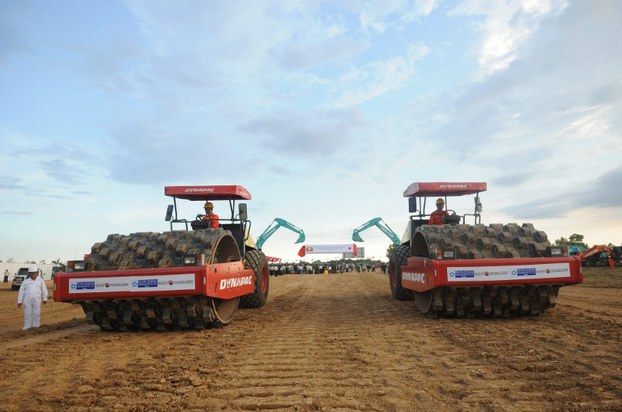




A U.S.-based rights group on Thursday accused Myanmar of violating international standards by displacing families to make way for a special economic zone (SEZ) being developed jointly with the Japanese government.
Physicians for Human Rights said in a report that authorities in Myanmar had threatened residents with legal proceedings if they did not comply with a forced eviction from the Thilawa SEZ and failed to provide them adequate compensation or means for a livelihood once they were relocated.
The displacement has also affected families’ food security and health conditions, as families reported higher levels of hunger, child malnutrition, and sickness, as well as reduced access to medical treatment, the report said.
The Thilawa SEZ is a joint venture between the governments of Myanmar and Japan and private consortiums. It is situated about 23 kilometers (14 miles) southeast of Yangon in Thanlyin-Kyauktan.
In its report, titled “A Foreseeable Disaster in Burma: Forced Displacement in the Thilawa Special Economic Zone” PHR surveyed 29 of the 68 households displaced during phase one of the project, which began in 2013.
When phase two begins, an additional 846 households, comprising 3,869 people, will be displaced.
“PHR found that the displacement process fell significantly short of meeting international guidelines, most notably because the residents felt threatened by the government with lawsuits and imprisonment if they did not move,” the report said.
“Furthermore, the compensation allotted to displaced persons was insufficient for them to maintain their livelihoods.”
PHR said that because the displacement at the SEZ had been planned, the circumstances for those relocated should have been significantly better than the minimum standards provided for under international guidelines, which would have presumed the situation had been caused by a humanitarian crisis such as a natural disaster or other emergency.
The report said that farmers who lost their land in the displacement “were not provided with other means or training to successfully earn a living” and that the average household income dropped by 78.1 percent after relocation, leaving many families without enough money to meet their needs.
The loss of livelihoods also had additional adverse consequences for food security and the health status of the displaced households, PHR said.
“The combination of severely diminished income, increasing food insecurity, and constrained access to health care creates a precarious situation for displaced residents,” the report said.
“Without intervention to improve livelihoods, the nutrition and health situation in the relocation site will continue to deteriorate.”
Recommendations
During phase one of the project, affected households were not consulted, received inadequate compensation, and were given limited time to prepare for relocation, the report said, violating their right to adequate housing and health care.
“The Thilawa project exemplifies how devastating forced displacement can be on local communities when governments completely disregard human rights laws for the sake of a business development,” Widney Brown, PHR’s director of programs, said in a statement.
“The [Myanmar] and Japanese governments should work to improve the living conditions for those displaced by this misguided venture, and ensure that this disaster is not repeated when hundreds of other families are relocated for future development projects.”
PHR said the community it sampled during the survey has served as a “harbinger of adverse consequences” for the additional 846 households to be displaced during phase two of the project and called on stakeholders to adopt several measures to prevent the “impending disaster.”
Among its recommendations, the rights group called for transparent procedures for evictions, for the improvement of humanitarian conditions at the relocation site, and for the U.S. government to raise the issue of forced displacement in bilateral communications with the government of Myanmar.